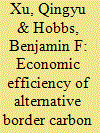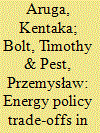|
|
|
Sort Order |
|
|
|
Items / Page
|
|
|
|
|
|
|
| Srl | Item |
| 1 |
ID:
179729


|
|
|
|
|
| Summary/Abstract |
To be effective, policies addressing power sector carbon emissions in jurisdictions that are embedded in larger carbon markets must account for carbon embodied in imports and the potential for leakage. Yet analyses of alternative border carbon adjustment (BCA) policies that carefully model the impact of generation mix, net load distributions, and transmission limits are rare in the literature. With a generation-transmission expansion planning model of Western North America, we compare the impacts of alternative BCA schemes that California's carbon pricing system could implement. These include no BCA, facility (import source)-based deemed emission rate, a facility-neutral and constant (over-time) rate, and a facility-neutral and dynamic rate. Our results suggest that, when compared to no BCA or BCA using facility-based deemed rates, a facility-neutral BCA can improve efficiency by simultaneously lowering market-wide emissions and costs without raising California consumer expenditures. Emissions leakage also declines significantly. The precise value of the deemed rate affects these gains; setting it equal to marginal emission rates external to California is most efficient. We also show that California's carbon pricing encourages more interstate transmission expansion because power imports become more profitable. However, BCAs that cost-effectively lower total regional emissions will dampen those incentives.
|
|
|
|
|
|
|
|
|
|
|
|
|
|
|
|
| 2 |
ID:
179735


|
|
|
|
|
| Summary/Abstract |
This study applied a discrete choice experiment using best-worst scaling questions (multi-profile, BWS case 3) to estimate the trade-offs which a sample of the Polish population is willing to make for energy reform regarding carbon reduction. Attributes considered in the study are CO2 emissions reduction, National energy independence, Employment impact, Time needed for policy transition, and Impact on household energy prices. Respondents (n = 639) choose the best and worst of the presented policy options to fit a rank-ordered logit model. This study reveals concern about climate change among respondents, but that they prioritize energy prices and employment in their choice of preferred energy policy with significant variation across groups. A key distinction is revealed in the preferences by age cohort in which youngest (<25years old) respondents had the strongest WTP coefficients, particularly for CO2 and time to transition. Stronger and more urgent desires for CO2 reduction policies were also identified among the decisions of female respondents, those having more education, those without children, and middle and upper income groups. The respondents’ choices also revealed consistent loss aversion in all attributes presented in the choice experiment.
|
|
|
|
|
|
|
|
|
|
|
|
|
|
|
|
| 3 |
ID:
166703


|
|
|
|
|
| Summary/Abstract |
We present a computationally-efficient optimization model that finds the least-cost generation unit expansion, commitment, and dispatch plan to serve hourly electricity demand and ancillary service requirements. We apply the model to a case study based on data from the electricity market in Texas (ERCOT) to analyze the market and investment impacts of several incentive mechanisms that support variable renewable energy (VRE) investments and carbon emission reductions. In contrast to many previous studies, the model determines least-cost VRE investments under different cost and incentive assumptions rather than analyzing scenarios where VRE expansion is pre-determined. We find that electricity prices can vary significantly under different incentive mechanisms, even when comparable generation portfolios result. Therefore, the preferred incentive mechanism depends on stakeholder objectives as well as the prevailing electricity market framework. Our results indicate that a carbon tax is more system cost-efficient for reducing emissions, while production and investment tax credits are more system cost-efficient for increasing VRE investments. Similarly, incentive mechanisms that reduce electricity prices may increase the need for separate revenue sufficiency mechanisms (e.g. a capacity market) more than a policy that increases electricity prices. Moreover, the impacts on consumer payments are not always aligned with changes in system costs. Overall, the analysis illustrates the importance of considering electricity market impacts in assessing the economic efficiency of VRE and carbon incentive mechanisms.
|
|
|
|
|
|
|
|
|
|
|
|
|
|
|
|
| 4 |
ID:
150045


|
|
|
|
|
| Summary/Abstract |
A low carbon fuel standard (LCFS) is a market-based policy that specifies declining standards for the average lifecycle fuel carbon intensity (AFCI) of transportation fuels sold in a region. This paper: (i) compares transportation fuel carbon policies in terms of their economic efficiency, fuel price impacts, greenhouse gas emission reductions, and incentives for innovation; (ii) discusses key regulatory design features of LCFS policies; and (iii) provides an update on the implementation status of LCFS policies in California, the European Union, British Columbia, and Oregon. The economics literature finds that an intensity standard implicitly taxes emissions and subsidizes output. The output subsidy results in an intensity standard being inferior to a carbon tax in a first-best world, although the inefficiency can be corrected with a properly designed consumption tax (or mitigated by a properly designed carbon tax or cap-and-trade program). In California, from 2011 to 2015 the share of alternative fuels in the regulated transportation fuels pool increased by 30%, and the reported AFCI of all alternative fuels declined 21%. LCFS credit prices have varied considerably, rising to above $100/credit in the first half of 2016. LCFS programs in other jurisdictions share many features with California's, but have distinct provisions as well.
|
|
|
|
|
|
|
|
|
|
|
|
|
|
|
|
| 5 |
ID:
112261


|
|
|
|
|
| Publication |
2012.
|
| Summary/Abstract |
Role of energy in the manufacturing industry is a major concern for energy and environmental policy design. Issues like energy prices, security of supply and carbon mitigation are often connected to the industry and its competitiveness. This paper examines the role and consequences of embodied energy in the European industry.
To this end, a multi-regional input-output analysis including 59 industrial sectors for all European Union countries and 17 more aggregated industries for other regions of the World is developed. Other segments of the economy are not included. This base is combined with energy consumption, carbon emission as well as bilateral trade data for every sector in all included countries.
Our main result is that embodied energy in manufactured products' imports represents a significant aspect of the energy situation in European industries, with quantities close to the direct energy consumption. These flows can further be broken down for detailed analysis at the sector level thanks to the number of distinct industries included. Results demonstrate that an important part of embodied energy inside European products is not concerned with domestic energy price changes. In addition, a European-wide carbon tax would induce an unbalanced burden on industries and countries.
|
|
|
|
|
|
|
|
|
|
|
|
|
|
|
|
|
|
|
|
|